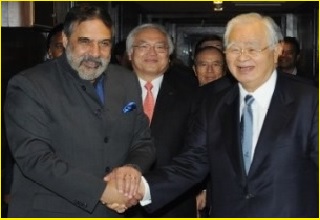WTO ITA has not helped domestic hardware industry: Anand Sharma
Updated: Jan 25, 2014 04:45:36pm

ITA (now also known as ITA-1), a plurilateral agreement of WTO, according to him has led to loss of investment in high value added manufacturing and decline in the share of domestically manufactured electronic components.
The WTO ITA is an undertaking to liberalise global trade in IT products. The Agreement was entered into force on 1 July 1997 with 29 original signatories, including Australia. The Agreement now comprises 75 participants which cover 97 per cent of global trade in IT products.
The objective of the Agreement is to bring down tariffs on IT items in stages to zero level by a specified year.
“In light of this, many measures have been taken by the government to build a sound manufacturing environment in the field of Electronics and Information Technology and Japanese companies can benefit from them,” he added.
Sharma had a meeting with the Chairman of Keidanren (Japan Business Federation) Hiromasa Yonekura, along with the top Japanese Business representatives in India, here today.
In order to encourage Investment in Electronic System Design and Manufacturing (ESDM) in the country, India today decided to offer a package of incentives to attract domestic and global investments into Electronic System Design and Manufacturing (ESDM) sector within Electronic Manufacturing Clusters (EMC) Schemes.
“In addition, the Government has recently approved the proposal for setting up of two Semi-conductor Wafer Fabrications (FAB) manufacturing facilities in the country,” Sharma said.
Sharma invited all Semi-Conductor Wafer Fabrication (FAB) manufacturers in Japan to avail subsidy/other benefits/support being offered by Government of India for establishing FAB facilities in India, according to an official release by the Ministry of Commerce and Industries.
Sharma also stressed strengthening of cooperation in creative industries, which ranges from design, apparel, fashion, food, house-hold goods, music, movies, animation and traditional craft would further promote and deepen mutual understanding of the two countries.
Earlier, Commerce Minister and METI Minister Edano had met on April 30, 2012 here and reached the common recognition that enhancing bilateral cooperation in the area of Creative Industries will be regarded as an important new pillar of Japan and India industry cooperation.
Secretary DIPP Saurabh Chandra met his counterpart in May 2013 and December 2013 to take the process forward.
Six MOUs between Japanese companies and Indian companies in areas such as traditional/regional products, animation, apparel/fashion, lifestyle/luxury products and food were signed in recent past.
National Institute of design (NID), Ahmedabad is taking lead in implementing the tasks assigned to them as regards to cooperation in the creative industry.
Sharma also told Yonekura about the progress in DMIC where Japan is the main partner.
He said that Japan is India’s biggest development partner and India is the biggest recipient of Japans Overseas Development aid. (KNN/SD)












